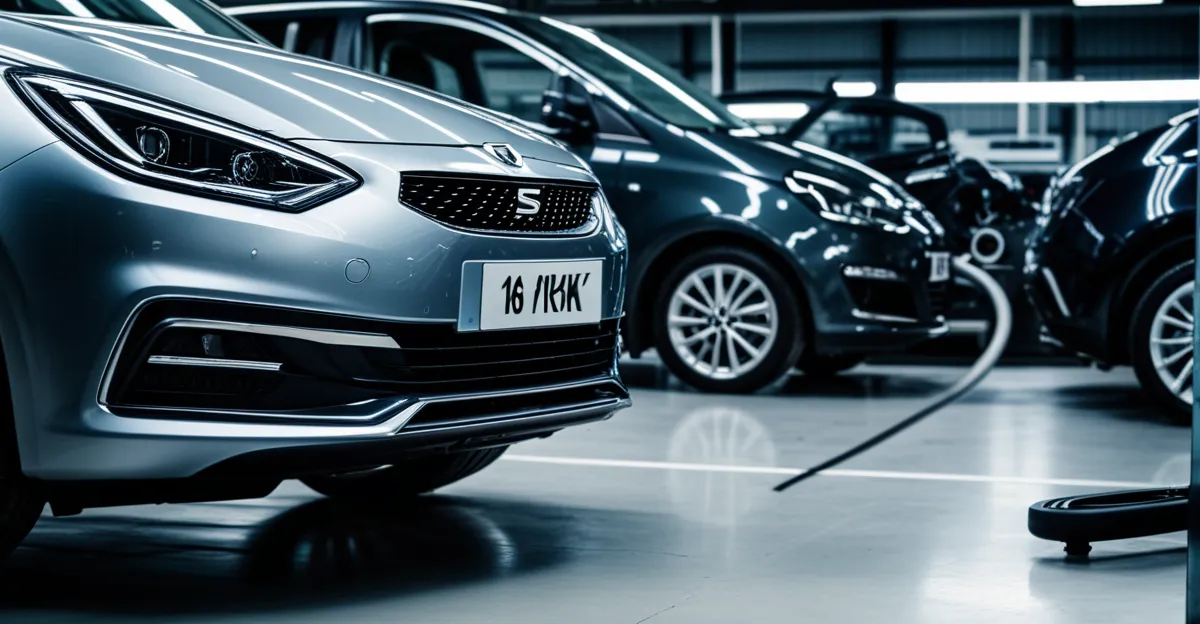Overview of the UK Automotive Sector Challenges
The UK automotive industry is currently maneuvering through a complex landscape shaped by multiple challenges. Economic conditions have significantly impacted the sector, influenced by factors such as fluctuating currency exchange rates and inflation, which affect both production costs and consumer spending power. As one of the major contributors to the nation’s GDP, the importance of the automotive sector to the UK economy cannot be overstated. It provides substantial employment, drives technological innovation, and contributes significantly to exports.
A deep dive into the current landscape reveals a market comprising some major global players. These include high-profile brands and a robust network of suppliers and small manufacturers that jointly navigate the turbulent waters of today’s challenges. Market dynamics are continually evolving due to technological advancements and changing consumer preferences, requiring agility and adaptability from industry participants.
In the same genre : How are UK automakers responding to the rise of autonomous vehicles?
Navigating the automotive sector challenges necessitates a strategic approach, considering the sensitivity to both internal and external disruptions. Overall, understanding the intricate balance of economic conditions, major players, and market dynamics is crucial for appreciating the complexities faced by the UK’s automotive industry.
## Impact of Brexit on the UK Automotive Sector
Navigating the post-Brexit landscape has presented significant **challenges** for the UK automotive industry. The severance from the European Union has led to palpable shifts in **trade relations**, impacting the sector's fundamental operations. Reduced access to the single market has introduced **trade deals** and adjustments that industry players were compelled to negotiate.
### Tariffs and Their Influence
One of the pressing concerns is the imposition of **tariffs** on parts and vehicle exports. These additional costs can strain both **manufacturers** and **suppliers**, potentially leading to higher prices for consumers. The financial burden is compounded by the currency fluctuations that remain a lingering side-effect of Brexit uncertainties.
### Uncertainty for Manufacturers
For manufacturers and suppliers based in the UK, uncertainty has become a norm rather than an exception. The looming potential for further **trade barriers** generates a climate of apprehension, affecting investment decisions and supply chain strategies. Companies are exploring meticulous planning and strategic alliances to offset these **Brexit implications**, attempting to maintain **competitive** edges in the evolving market.
Supply Chain Disruptions
Supply chain challenges have become a defining hurdle for the UK automotive industry, significantly affecting logistics and the availability of critical components. Global shipping delays, exacerbated by events such as the COVID-19 pandemic, have created substantial bottlenecks in the supply chain. Many manufacturers rely heavily on seamless logistics operations, but disruptions have led to production slowdowns and increased costs.
In the same genre : What is the future of car-sharing services in the UK automotive market?
At the core of these challenges is the just-in-time manufacturing strategy, a vital aspect of the automotive sector. This approach, which relies on receiving components precisely when needed in the production process, means any delay can have dramatic repercussions. Consequently, companies are compelled to rethink their logistics frameworks to build more robust and adaptable supply chains.
To counteract these component shortages, businesses are implementing various strategies. Some are diversifying their supplier base to reduce dependency on a single source, while others are increasing their stock levels as a buffer against future shortages. Additionally, enhanced digital tools for supply chain management are being adopted to anticipate and mitigate potential disruptions, demonstrating the industry’s resilience in the face of adversity.
## Transition to Electric Vehicles (EVs)
The **electric vehicle transition** is reshaping the UK automotive industry as it adapts to a more sustainable future. Driven by stringent **government policies** promoting EV adoption, the sector is experiencing a notable shift towards electrification. Incentives include subsidies for buyers, and investment in **infrastructure** to enhance charging networks, offering advantages but also posing significant challenges.
A critical hurdle in this transition is the underdeveloped **charging infrastructure**. Many areas require extensive upgrades to support widespread EV usage, with urban centers particularly struggling to meet demand. Ensuring coverage and availability of fast-charging stations is vital for consumer confidence and adoption rates. The government and industry are tasked with ensuring that infrastructure development keeps pace with vehicle sales.
Additionally, competition from **international markets**, where EV technology has seen rapid advancements, underscores the urgency for the UK to innovate. Keeping pace with these developments is essential to remain competitive globally. To advance in this arena, the UK must focus on research and development, leveraging technological breakthroughs to maintain a strong position in the global EV market.
Labor Shortages in the Automotive Industry
Facing ongoing workforce challenges, the UK automotive industry grapples with a significant skills gap and recruitment issues. Current statistics indicate a pressing need for skilled labor, with many companies struggling to fill pivotal roles essential for maintaining production efficiency. These shortages are felt across various levels, particularly in roles requiring advanced technical skills and expertise in emerging technologies.
Specific skill sets in high demand include those related to electrical engineering and software development, crucial as the industry leans into electric and autonomous vehicle technologies. As a solution, companies are increasingly investing in upskilling initiatives and apprenticeship programs designed to nurture talent from within and attract new workers to the sector.
To effectively address these recruitment issues, businesses are also implementing appealing incentives and flexible working arrangements to drawn in modern workforce expectations. By focusing on creating a supportive and development-oriented work environment, the industry aims to retain talent and bridge the skills gap crucial for future growth and innovation.
Changing Consumer Preferences
The automotive sector faces evolving consumer trends that are reshaping market demand and preferences. A notable shift towards sustainable and eco-friendly vehicles is being driven by increasing environmental awareness. Consumers are more inclined to choose vehicles with lower emissions, prompting manufacturers to invest in greener technologies and electric vehicle (EV) options to meet this demand.
Urbanization is also transforming car ownership trends. In bustling cities, the appeal of car-sharing services and public transportation is growing. This shift impacts market demand, as city dwellers opt for more flexible mobility solutions rather than traditional car ownership. The rise of smart city initiatives further drives the integration of diverse mobility hubs, accommodating these new preferences.
Furthermore, technology and connectivity play pivotal roles in consumer choices. Features like in-car digital assistants, connectivity solutions, and advanced infotainment systems are becoming decisive factors for buyers. As connected vehicles become standard, automotive companies must continuously innovate to align with these technological trends, ensuring they cater to consumer expectations and preferences.
Regulatory Challenges Faced by the Industry
The UK automotive sector is navigating a complex web of regulatory challenges that impact every aspect of its operations. At the forefront are stringent automotive regulations, which demand compliance with evolving safety standards and emissions criteria. These regulations aim to enhance vehicle safety and reduce environmental impact, necessitating substantial adjustments in vehicle design and production processes.
Emissions Standards and Their Impact
One critical area of regulation involves emissions standards, which influence not only the engineering of vehicles but also the financial health of manufacturers. Stricter regulations require innovation in engine technology and reduction of vehicular emissions, often leading to increased production costs. Manufacturers must invest in research and development to meet these requirements, which can affect overall profitability if not managed effectively.
Compliance and Associated Costs
The compliance costs linked to meeting regulatory demands are significant. Automotive companies must allocate resources to ensure adherence to these standards, which involves regular testing, certification, and potential redesign of vehicles. While compliance is non-negotiable, the high costs can strain financial resources, especially for smaller manufacturers. This necessitates strategic planning to balance investment in compliance with maintaining competitive pricing in the market.
Safety Standards and Vehicle Design
Safety standards play a crucial role in shaping vehicle design, focusing on protecting passengers and reducing accident risks. Adhering to these standards requires continuous innovation in safety features such as advanced driver-assistance systems and reinforced structural components. The commitment to safety not only safeguards consumers but also enhances brand reputation, providing a competitive edge in a market where consumer confidence is paramount.
Potential Solutions and Future Strategies
The UK automotive sector is at a crossroads, challenged by multiple industry strategies that are crucial for steering into a sustainable and competitive future. The focus is on innovation and embracing technologies that can reshape the landscape. Key areas include advancements in electric vehicle technology, leveraging AI for manufacturing efficiency, and enhancing aerodynamics to meet stringent environmental regulations.
Collaborative initiatives between manufacturers and government play a pivotal role in driving progress. This collaboration can accelerate the development of charging infrastructure and support R&D projects aimed at reducing carbon footprints. By aligning on a common goal of sustainability, these partnerships foster an environment conducive to technological growth.
In terms of long-term strategies, maintaining resilience and competitiveness involves cultivating a skilled workforce adept in emerging technologies. Exploration of new markets beyond traditional borders can also provide economic insulation. Moreover, focusing on digital transformation initiatives ensures companies are agile and adaptable, ready to thrive amid evolving industry norms and global challenges.






